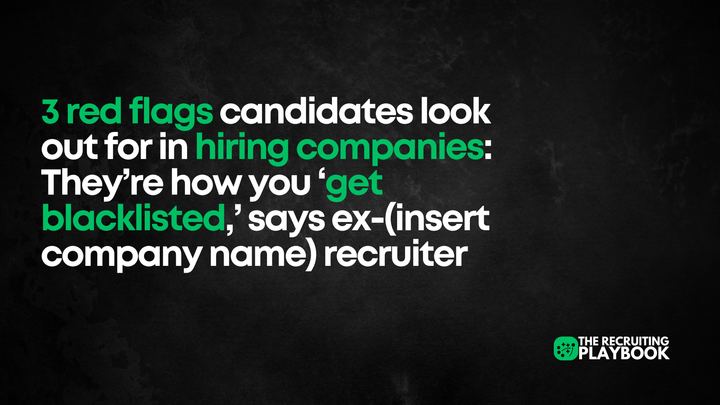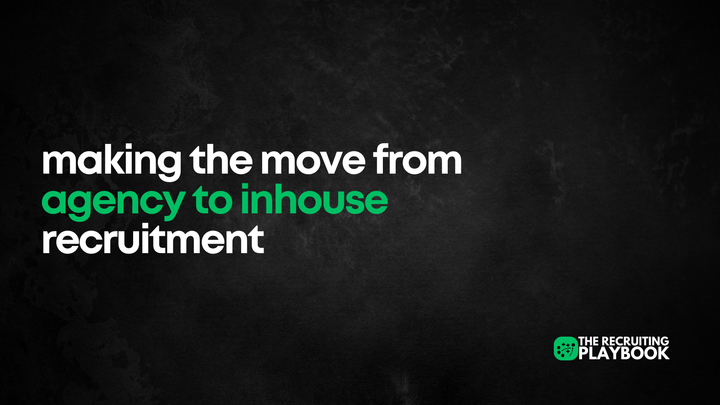A Culture of Hiring

About 12 months ago I watched Nellie Peshkov present at LinkedIn Talent Connect in Vegas (via YouTube unfortunately!) about how they’ve created a culture of hiring at Netflix and I’ve watched it at least a dozen times since then.
What she talks about isn’t rocket science, in fact a lot of it is pretty basic stuff – but after every viewing I’m left with a fire in my belly and asking myself the following question:
How can Talent Acquisition work even better with the business than we do right now?
The Master-Servant Relationship
You’ll notice above I used the phrase ‘work better with the business’, I deliberately didn’t use phrases such as ‘for the business’, ‘support the business’ or ‘serve the business’ that are quite commonly used.
Nobody is to blame for this master-servant type relationship, it’s just how the relationship always was before the days of internal recruitment teams – a hiring manager needed to fill a role and an agency recruiter would work on it for payment and thus the master (customer) and servant relationship was born.
Given most internal recruiters started out in the agency world many have just accepted that this is how it works.
To truly partner with the business and get anywhere close to creating a culture of hiring we need to step away from the mind-set of them being our customers and we also need to help our hiring managers understand that building a team and recruiting into it is their job. Our job is to facilitate, help source, show them how and advise – our job isn’t to serve.
Anyway, after watching Nellie’s video for the first time, and every time since I’ve tried a few different ways of working with my hiring managers to improve how we work together and thought I’d share – again, a lot of it isn’t rocket science but has worked for me.
Understanding the role
Not the role you’re looking to fill. We’re taught early on in our recruitment lives how important it is to thoroughly understand the role and get a detailed brief from the hiring manager.
What I’m talking about here, is the hiring managers and business understanding our role. What is it we actually do? What are we there to achieve? How has recruitment changed? What goes into actually producing a shortlist of quality candidates?
Think about it, most manager’s experience of recruitment is probably limited to:
1. Tell the recruiter (internal or agency) what you want and answer a few questions
2. Recruiter sends you some CVs
3. You interview them
4. Rinse and repeat until you find a suitable candidate
5. Tell the recruiter who you want to offer the role to.
6. Recruiter makes the offer
7. The next time you speak to the candidate is on their first day
Any recruiter who is reading this will know the detail and work that goes into each and every stage of the recruitment process, how the approach needs to alter depending on the role, the market and candidate.
Does the hiring manager know where those CVs have come from? Do they just think you posted that 1997 job spec online and sent them the best candidates that applied?
Do they know that you’ve tried 237 different variants of your search strings across 12 different platforms, viewed hundreds of CVs and pre-screened in detail 14 candidates to produce them that shortlist of 3 candidates? Do they also know that you’ve done the same thing for the other 52 vacancies you’re working on?
How can we expect our hiring managers to understand if we never give them a glimpse into our worlds? And why do they need to know? Why should they care? It’s not their job right?
Wrong, recruiting is a key part of their role and if you invest the time in showing them how bloody tough recruiting can be you’ll get that time back ten-fold. Referrals will increase, you’ll get better briefs, you’ll get faster feedback, they might even source with you, hell they might even enjoy the recruitment process!
Search with them
I mentioned giving your hiring managers a glimpse into your world. Spend an hour with them searching LinkedIn or whatever the most appropriate tool for your industry is.
Run a search based on their requirements, let them see what the potential candidate pool looks like, get them to talk through which profiles look suitable and why. Not only will you get more insight into the role and what good looks like, your hiring manager will start to understand what’s involved when we source candidates.
Build a long list with them, let them see that of the 3,403 candidates in the search results that probably 20 are a close enough match to send a message to. Explain to them probably only a handful of these will reply to the message, and fewer still will be interested and a confirmed match after pre-screen.
Teach them the basics of Boolean searches and they can even run their own searches in tandem with your own.
They’ll begin to understand our world a little better and appreciate the part TA plays in sourcing candidates to help them recruit into their team.
Leverage their networks
Once they’ve began to understand the challenges around sourcing and the work that goes into it, you can help them understand why you can’t rely on sourcing along. You need to leverage their network and the network of their team.
Work with them to flesh out their LinkedIn profiles, run workshops with their teams so they can flesh out theirs too. Help them to understand the importance of sharing vacancies with their networks, but also how important it is to contribute to their networks with non-vacancy related content and build up their own reputation in the industry and by default the organisations.
Show them that by having an online presence they can position themselves as experts in their field and as people that other people will want to work with. This will, in time, help massively in attracting great talent – I’ve seen it happen here.
We ran workshops with our Data Intelligence teams, showing them how important LinkedIn is for raising their profile – we filled 11 notoriously difficult to fill roles in less than 3 months through a combination of sourcing, advertising and social sharing. Social sharing accounted for a third of those hires.
Regular Contact
How often do you meet with your hiring managers when they’re recruiting? How about when they’re not recruiting?
When they’re recruiting, I try to do short 15 minutes informal catch-ups, in person, sometimes twice a week, sometimes daily depending on the number of vacancies they have.
These regular, short sessions help achieve a number of things. You can discuss progress, successes and challenges more frequently, meaning you can pivot sooner in the process if you need to. You can get CV and interview feedback faster, moving candidates through the process more quickly – reducing the risk of losing candidates through delays and giving candidates a great experience.
The other big benefit – regular face time together, building on your relationship for the future.
How about when they’re not actively recruiting? Never under estimate the importance of face time, grab a coffee with them, attend some of their team meetings or even sit in their team.
I have a weekly coffee in the diary with our head of engineering, even when he’s not recruiting. Sometimes we talk about future talent demand in his teams, what other businesses are doing right now, sometimes we just put the world to rights for half an hour.
But it’s half an hour well spent regardless of what we’re talking about because when he is recruiting we both know and understand each-other’s worlds, the challenges we face and how we can work together to solve them.
Challenge and be Challenged
Once you understand each-other’s worlds, you move away from that master-servant relationship and feel more comfortable challenging each-other. You both know you’re trying to do what you think is right, but that understanding helps provide the context of each challenge and that relationship makes those challenges less uncomfortable.
Why it matters
Recruitment is tough. As recruiters, hiring managers can sometimes be your biggest obstacle in the process but they can also be your greatest asset. I’d choose the latter every time, and that’s why it matters. If you want to bring in top talent you need to work with your hiring managers, you need their help and they needs yours…you’re in it together.
Subscribe
Subscribing to this site gives you access to premium articles, subscription to my newsletter and a free copy of My Ultimate Guide To Job Searching.
Follow Me
Find me on LinkedIn , TikTok , YouTube or Instagram where I share lot’s of practical no nonsense advice.
Get Your Copy Of My Ultimate Guide to Job Searching
Searching for a new job can be tough, the right mindset and strategy can help. Download my “Ultimate Guide To Job Searching” ebook to help which also includes 180+ interview questions, interview tips and email templates.
Get your copy here The Ultimate Guide To Job Searching
Or get it for free by subscribing to this site.
Support This Site
With rising subscriber numbers (you're all awesome, thank you!) the costs of hosting this site and sending newsletters is rising. If you can support this site with a voluntary donation, I'd really appreciate it
You can donate here



